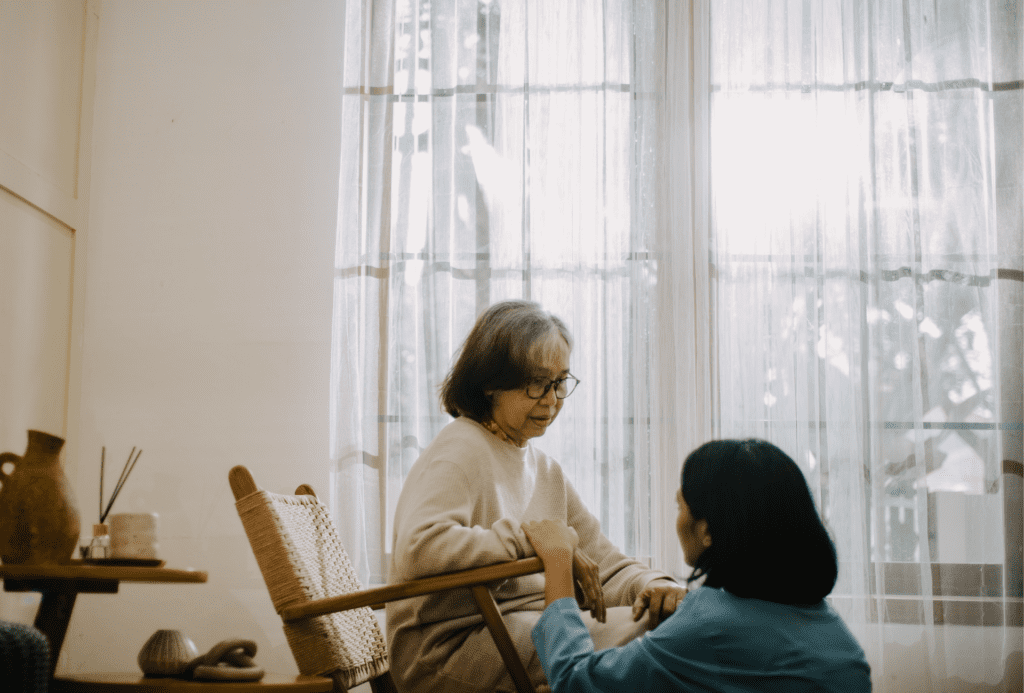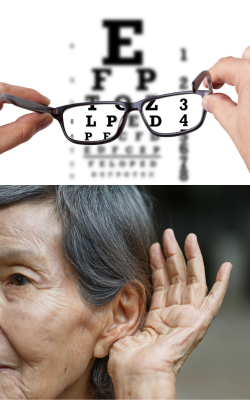When to See the Doctor
Changes to Physical or Cognitive Health
It’s important to see a doctor throughout the person’s journey with dementia. This is to keep the person healthy and yourself healthy too. Many people start to see a doctor at the earliest signs of dementia symptoms such as forgetfulness, challenges completing familiar tasks, language difficulties, or confusion with time or place. Sometimes symptoms are misinterpreted as old age and people don’t see a doctor until the symptoms are further along. A proper medical diagnosis for dementia is important because there are numerous potential causes.

Some causes of dementia symptoms can be medically treated and the symptoms can improve such as vitamin and nutritional deficiencies, infections and illnesses, depression, or such as stroke, brain swelling or tumor. Possible causes where treatments are limited include Alzheimer’s disease, vascular dementia, Lewy-body dementia, and others require a diagnosis so that an appropriate treatment and care plan can be put into place. After diagnosis and throughout the dementia journey, there will be many times a doctor will want to follow up with the person experiencing symptoms. Learn more about the different kinds of health care providers knowledgeable about dementia.
When Behaviors Mean Something More
Sometimes a behavior means something more acute is going on with the person experiencing dementia. It’s important for caregivers to be mindful of any sudden changes to the person’s physical or cognitive health as dementia typically progresses slowly over months and years. There shouldn’t be a day-to-day change in the person’s personality or abilities. It’s also important to maintain regular check-ups for health, eyesight, hearing, mobility and other concerns because problems in these areas might cause a behavior such as frustration, anger, or added confusion for the person with dementia.

Question to ask yourself:
Can the person see and hear clearly?
Eyesight:
- When was the last time the person had an eye appointment?
- Does the person wear eyeglasses?
- Is the prescription up to date?
- Do they keep misplacing eyeglasses?
- Can eyeglasses be placed on lanyards so they are nearby?
Hearing:
- When was the last time the person had their hearing tested?
- Have the person’s ears been checked for wax buildup?
- Does the person wear hearing aids?
- Do the person’s hearing aids need adjusting to softer or louder?

Is the person experiencing something uncomfortable in the environment or interacting with others?
- Check room temperature, room brightness, overstimulation such as noise or too many people.
Is the person experiencing any pain?
- Could problems such as toothache, stomachache, flu, discomfort with being seated too long without moving around, or arthritis be causing the person’s discomfort?
Is the person fearful?
- Could the person be interpreting something in the environment differently that is causing them fear? Hallucinations and delusions can occur with dementia, but should be thoroughly investigated for any environmental causes, then discussed with the doctor for possible treatment.
Other Acute Illnesses

Other illnesses faced by people may have nothing to do with their dementia. Each illness needs to be assessed and treated by health care professionals and according to the person’s wishes. The family should discuss with the person’s doctor how other illnesses and side effects of treatments will impact the person’s dementia. For example, surgeries which require anesthesia can make the person’s dementia worse. Families should ask the doctor how this will be monitored and treated.
Another common illness people with dementia experience is UTI or urinary tract infection. Left untreated, UTI’s can mimic significant cognitive decline or delirium. It’s important that people with dementia stay hydrated throughout the day. Although it may seem easier to withhold liquid from a person so fewer bathroom breaks are needed – it can cause the person harm – and lead to more serious consequences. Learn more about the different kinds of health care providers knowledgeable about dementia.
Medication Management

The average older person in the United States takes nine medications per day. Many of these medications are prescribed by separate doctors in different specialties. Numerous pharmacies may also be used. It is important to report to the primary care doctor all medications the person is taking – prescription and over-the-counter – so the doctor can be mindful of medication interactions.
Sometimes medication interactions can be a cause of dementia-like symptoms and can certainly make dementia symptoms worse. There may be other options such as dosage or timing instructions. Food interactions with certain medications may also be the culprit for sudden changes in a person. You will also want to discuss with the doctor your observations of whether the person’s medications appear to be working or not working the way they were prescribed. Learn more about the different kinds of health care providers knowledgeable about dementia.
Bottom line: See the person’s doctor right away for any sudden physical or cognitive changes.
Encouraging Words for You:
I am doing the best I can do. I need not fear what tomorrow holds, but can take each day as a chance to learn something new and grow in my confidence as a caregiver. When I am frustrated, I will take a few deep breaths and remind myself that patience is a virtue I can and will embrace.
– Anonymous
The information on this page was developed by Nicole Batsch, Ph.D. and is for educational purposes.
For individualized medical guidance, consult your physician.
